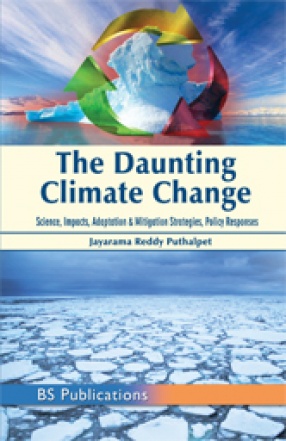The Daunting Climate Change
The Book starts with an overview of Climate Science and discusses the signs of Warming, the impacts and consequences on several sectors - terrestrial and coastal ecosystems, water resources, ocean systems, agriculture, food production and food security, human health and security, livelihoods and poverty, Arctic populations, low-lying States, so on. Mathematical models to project future climate and the resulting concerns, the global adaptation experiences and the opportunities available for future execution are explained. The mitigation approaches, chiefly decarbonizing the energy sector by developing and applying clean/low carbon energy sources and improving energy efficiency, and the evolving geoengineering schemes are clearly dealt. The carbon pricing, an economic tool to ensure emissions reductions, and transition to low carbon economy to stimulate sustainable growth are described. The continued global efforts under UN or otherwise until the recent Paris Agreement to arrive at policy responses to tackle this intriguing but daunting problem of climate change are vividly expounded. Professor Yiannis Levendis, College of Engineering Distinguished Professor, Northeastern University, Boston, MA, observes about the Book: “Prof. Reddy has painstakingly compiled an abundance of data from a plethora of references to support the conclusions. All topics are presented with exemplary organization and crystal-clear clarity.” About Climate Change: UN Secretary-General Antonio Guterres addressing World Economic Forum in January 2019 observes: “I think the climate risk is the most important systematic risk for the near future. I believe we are losing the race. Climate Change is running faster than we are. And we have this paradox: the reality is proving to be worse than scientists had foreseen, and all the last indicators show that.” Professor William Nordhaus, Sterling Professor of Economics, Yale University & 2018 Nobel laureate in Economic Sciences observes: “Economic theory suggests that the best remedy for such externalities is a pollution charge, a charge on carbon emissions or what is now called carbon tax. A carbon tax raises the price of carbon emissions to reflect its social costs. It provides powerful incentives to reduce emissions……” Professor Nicholas Stern, Chair, Grantham Research Institute on Climate Change and the Environment, London School of Economics observes: “Climate change is the biggest market failure in human history”; and after reaching Paris Agreement, he optimistically reacts, “If we get this right, it will be more powerful than the industrial revolution. A green race is going on.
Contents: 1. Earth Climate System – Overview. 2. Observed Changes in Earth System and their Causes. 3. Impacts on Systems and Vulnerability. 4. Global Adaptation Experience. 5. Future Climate Change Projections. 6. Identified Risks and Opportunities for Adaptation. 7. Mitigation of Climate Change. 8. Global Policy Responses to Climate Change.
Get it now and save 10%
BECOME A MEMBER



Bibliographic information